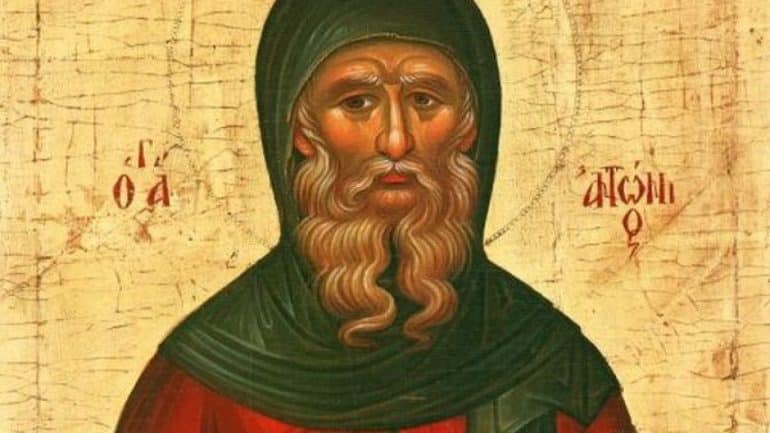At the top of the great ascetics of our Church is Anthony the Great and that is why our Church rightly gave him the title of the Great, because, as we will see below, he was the model of the orthodox monastic ideal. After all, he is also called the "professor of the desert", because he founded healthy Christian monasticism and remains the teacher of subsequent monks to this day.
His biography was written by M. Athanasios, who was his student and spiritual child. He was born in the city of Coma in Lower Egypt, near Memphis, around 251 in the years of the paranoid and religious Roman emperor Decius (349-251), who had instituted the harshest persecution against Christians up to that time. His parents were wealthy devout Christians, to whom he owed his piety. He learned few letters and may have been completely illiterate, but he had acquired many virtues, which stemmed from his deep Christian faith. From a young age he had shown signs of self-sufficiency, asceticism and introversion, so that he differed from the other children of the town. His favorite habit was to follow his parents to the Church and to stay in the temple participating in the sacred services and listening to the sacred readings with attention.
The early years
In his teenage years he lost his parents and they were left alone with his little sister, whom he took care of. But six months later, he heard in the Church the Gospel passage, Christ's exhortation to the rich young man: "Sell your possessions and give to the poor and lay up treasure in heaven, and follow me" (Matthew 19,21:300). He felt that this speech was addressed to him as well. So, moved, he made the great decision to follow Christ. He gave away his property, which consisted of XNUMX fertile estates, to the poor, entrusted his sister to a girls' school, and himself retired outside his village to a secluded cell, imitating some venerable ascetic, whom he admired and wished to imitate.
After a while he decided to retire to the desert for greater exercise and quiet, away from worldly cares and the temptations of the world. From time to time he visited other hermits, in order to obtain rich spiritual experience and to be taught the true life in Christ. He lived in unceasing prayer and vigil. He fasted hard, eating once a day after sunset. Later he ate every two or even four days only bread, salt and water. He was never unemployed, he worked tirelessly, thanks to which he saved his meager food and the means to show mercy to the poor. At the same time as he worked, he prayed and meditated on the divine gifts for himself and the world. During the breaks he read the Holy Bible and other spiritual readings. It didn't take long for his sanctity to shine through. His close associates loved and respected him for his faith, meekness and humility and tried to imitate him.
The cunning calculations of the devil
But the wicked devil could not see such a spiritual advance in Antonio and therefore began his furious attacks against him. He tricked him into leaving the desert and returning to the world. She put in his mind cunning calculations about carnal pleasures and pleasures.
She used to take the form of a provocative woman to lure him into sin.
Sometimes he falsely informed him that his sister had gone the wrong way, that she had allegedly become a prostitute and that he had to come down to the world to save her. He often put thoughts of pride and avarice into his mind. But Antonius heroically countered all satanic insults. After the devil saw that it was impossible to distract him from the exercise and seduce him into sin, he began to cause him physical pains and diseases, with the aim of making him cry out against God. He also faced them with courage and heroism, never uttering a bad word about his trials. At the end he presented himself as a sullen child and confessed his defeat. Then he left and did not bother the saint again.
He frequented a cemetery, where he slept in a grave. There he philosophized about the futility of worldly life and the value of eternal life. One night he was attacked by a multitude of demons, who beat him and left him half dead. Then he came in the form of wild beasts and deadly reptiles, whom they threatened. Knowing they were demons, he cursed them, causing them to become invisible, expressing their anger with noises, grunts and gnashing of teeth.
He continued unabated his ascetic struggle and purification from his passions. But Antony lived in the era of the harshest persecutions against Christians. During the reign of Emperor Maximian (285-311) he came down to the world to support the fiercely persecuted Christians. He did the same when the Church was in danger from the terrible heresy of Arius. He came down to Alexandria to support the Orthodox and fight the heresy, although he was a hundred years old. His fame reached Vasilevousa. M. Konstantinos corresponded with him and consulted him.
He died peacefully in 356 at the age of 105. His memory is celebrated on January 17.
Teachings
A number of his teachings have been preserved to us, which express genuine Christian spirituality. M. Antonios was the spiritual guide of Athanasios the Great, who is characterized as a "Pillar of Orthodoxy". Every time he faced difficulties or persecution, he fled to the hermitage of M. Antonius to get strength from him and advice for his struggle in favor of the saving truth of the Church. M. Antonios embodies the genuine Christian monastic and ascetic life.
Source: ekklisiaonline.gr
